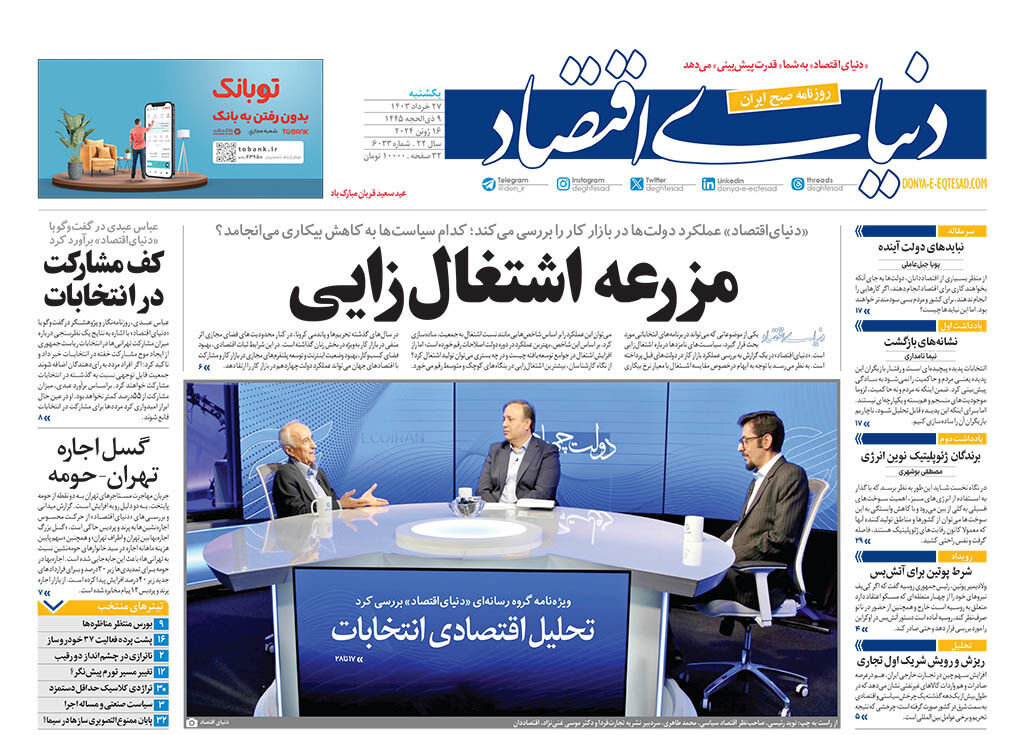Imbalance in the prospect of two competitors

TEHRAN - In an analysis, Donya-e-Eqtesad dealt with the prospect of cementing diplomatic relations between Iran and Saudi Arabia and said: There are two doctrines of thought in Saudi Arabia's political circles.
One continues to mistrust Iran and believes that this country is behind all the problems in the region. Another considers Iran as a security problem that can be controlled by improving bilateral relations. From Riyadh's point of view, the first is aimed at the de-escalation and establishment of political relations, followed by more fundamental discussions that address the main tensions between the two countries and help build trust and goodwill. After that, the parties can continue to further cooperate in various areas specified in the agreement, including trade, security, and people-to-people exchanges. Currently, Riyadh believes that relations are still in the first phase as de-escalation is incomplete, while efforts to build political relations have not followed the expected protocol yet. In response to this issue, a senior Iranian official said that diplomatic details should not delay the practical work of advancing bilateral relations.
Iran: The new security order in West Asia
In a note, the Iran newspaper addressed the new strategy of the Arabs in the region and wrote: The new security order in West Asia has led the Arabs to adjust their foreign policy orientations. A new level of Arab relations with China and Russia shows the pessimism of the Arab countries of the Persian Gulf towards America's policies in the region, an example of which is the Gaza war. The Hamas attack occurred just as a new order seemed to be emerging in the region. According to Foreign Affairs, in the future, U.S. leaders will seek to end the conflict in Gaza and they will negotiate for a permanent settlement of the Israeli-Palestinian conflict. The United States also hopes to strengthen regional alliances against Iran and limit China's engagement in the region. To achieve these goals, Washington needs the participation of Arab countries, but it will be more difficult to achieve if the Arabs become pessimistic about America's goals in the Middle East. In the same way, the Arab governments that were looking for "balancing" against Iran, it seems that they are currently more looking for East-West balancing against the United States of America!
Jam-e-Jam: Mercenaries of the enemy are busy!
Due to the atmosphere of the 14th presidential election, the election activities have reached their peak, and media operations are active to support or destroy the candidates. This is exactly the point that counter-revolutionary currents and opposition think tanks have invested in with a special focus. They seek to influence the atmosphere of domestic public opinion. During the current elections, we are witnessing a pattern similar to the riots of the fall of 1401(2022) from the opposition media. Virtual (trolls and robots) and real enemy agents in social networks and messaging apps are planning extensively to create tension along with destroying and insulting candidates in the election atmosphere. The headquarters and supporters of the election candidates should carefully deal with these atmospheres and stay away from false excitement, and not allow the peace prevailing in the society to be disrupted for the benefit of the enemy, because the country has faced such bitter conditions many times.
Shargh: Controlled response
In a conversation with senior nuclear analyst Esmail Kiani, Shargh addressed the recent European troika resolution against Iran and Iran's response to it. It wrote: Rafael Grossi claimed Iran's decision to increase the production capacity of enriched uranium in Natanz and Fordow sites. These actions are a controlled response from Iran's side in such a way that it can both react to the resolution of the Board of Governors and the severity of its response should not be so that it stimulates the sensitivity of the International Atomic Energy Agency or the Board of Governors. Due to Tehran's serious focus on holding presidential elections, Iran currently has no reason to increase tension with the International Atomic Energy Agency and the Board of Governors. Tehran has concluded that in the 15 months until the expiration of Resolution 2231, it should not make its nuclear case so sensitive that it acts as a catalyst for the radical actions of the West in order to activate the snapback mechanism and refer the case to the Security Council. It is unlikely that the Board of Governors will take action to hold an early meeting or want to show a strong response to Tehran's reaction.

Leave a Comment